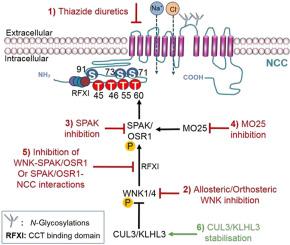Acta Pharmaceutica Sinica B ( IF 14.5 ) Pub Date : 2020-09-22 , DOI: 10.1016/j.apsb.2020.09.009 Nur Farah Meor Azlan , Maarten P. Koeners , Jinwei Zhang

|
Hypertension is the largest risk factor for cardiovascular disease, the leading cause of mortality worldwide. As blood pressure regulation is influenced by multiple physiological systems, hypertension cannot be attributed to a single identifiable etiology. Three decades of research into Mendelian forms of hypertension implicated alterations in the renal tubular sodium handling, particularly the distal convoluted tubule (DCT)-native, thiazide-sensitive Na–Cl cotransporter (NCC). Altered functions of the NCC have shown to have profound effects on blood pressure regulation as illustrated by the over activation and inactivation of the NCC in Gordon's and Gitelman syndromes respectively. Substantial progress has uncovered multiple factors that affect the expression and activity of the NCC. In particular, NCC activity is controlled by phosphorylation/dephosphorylation, and NCC expression is facilitated by glycosylation and negatively regulated by ubiquitination. Studies have even found parvalbumin to be an unexpected regulator of the NCC. In recent years, there have been considerable advances in our understanding of NCC control mechanisms, particularly via the pathway containing the with-no-lysine [K] (WNK) and its downstream target kinases, SPS/Ste20-related proline-alanine-rich kinase (SPAK) and oxidative stress responsive 1 (OSR1), which has led to the discovery of novel inhibitory molecules. This review summarizes the currently reported regulatory mechanisms of the NCC and discusses their potential as therapeutic targets for treating hypertension.
中文翻译:

Na–Cl辅助转运蛋白NCC的调控控制及其对高血压的治疗潜力
高血压是心血管疾病的最大危险因素,而心血管疾病是全球死亡的主要原因。由于血压调节受多种生理系统的影响,因此高血压不能归因于单一的可识别病因。孟德尔形式的高血压研究进行了三十年,涉及肾小管钠盐处理的改变,特别是远端曲旋小管(DCT)-天然,噻嗪类敏感的Na-Cl协同转运蛋白(NCC)。NCC的功能改变已显示出对血压调节的深远影响,如分别在戈登氏综合征和吉特曼综合征中NCC的过度活化和失活所说明的。实质性进展已发现影响NCC表达和活性的多种因素。特别是,NCC的活性受磷酸化/去磷酸化的控制,NCC的表达受糖基化的促进,而泛素化的作用则受到负调控。研究甚至发现小白蛋白是NCC意外的调节剂。近年来,我们对NCC控制机制的理解取得了长足的进步,特别是在通过包含无赖氨酸[K](WNK)及其下游目标激酶,SPS / Ste20相关脯氨酸-丙氨酸丰富的激酶(SPAK)和氧化应激反应1(OSR1)的途径,导致了发现新的抑制分子。这篇综述总结了目前报道的NCC调节机制,并讨论了其作为高血压治疗靶点的潜力。



























 京公网安备 11010802027423号
京公网安备 11010802027423号